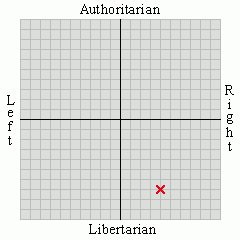I’ve just read Sackerson’s piece at the Orphanage on why Britain needs AV and compulsory voting, and while I supported AV – the just rejected proposal was, I feel, superior both to FPTP and also to the full preferences variant used in most elections here in Australia* – I have to disagree with him on that other distinction of Australian elections, compulsory voting. I used to be a fan of the idea and had you asked me fifteen years ago I’d probably have agreed, but having now spent several years and seen three elections, two federal and one state, in a country that does force its citizens to partake in the so-called democratic process whether they want to or not, I’ve come to believe very strongly that it’s a terrible idea. In no particular order, and cribbing from a comment I left at OPat Nurse’s a few hours ago, here’s why.
How bad are the political classes now when they still have to put in some effort to get the vote out? Quite often they stink, and that’s despite the fact they need to run around rounding up, and occasionally even digging up, voters ahead of election day. Even then once the winner is declared they tend to stop caring for the next few years. Now, how bad do you think they’ll be when they can say “Ah, stuff it, the proles have to go vote no matter what we do”? As a whole their attitude is already less than their electorates expect or deserve, especially in the safer seats, but if they’re guaranteed a turnout of 90% or more simply due to the threat of punishment for those who don’t show up you can expect things to get worse. Should there be more incentive for citizens to vote? Yes, but compulsion is not only not an incentive but it’s also likely to further erode if not completely remove any incentive the politicians have to try to be worthy of being voted for.
Secondly, there are knock on effects. You know all those millions who don’t bother voting now? You know what their Aussie counterparts do? It’s called donkey voting and consists of rocking up, voting for the first name on the paper without even bothering to look at who it is and what they stand for, and sticking it in the ballot box (obviously here they number all the boxes from top to bottom, or if they’re feeling adventurous they might go from bottom to top). When this began here the parties around at the time quickly cottoned on to the advantage of selecting candidates not on ability but on the alphabetical priority their name would get on the ballot. Aaron Aardvark, a chicken strangler who gives his sister flowers for Mother’s Day and who thinks asylum seekers shud arl bee reparti… repaticat… rapettricate… shot suddenly becomes a better candidate than William Watson, a recently retired Army doctor whose life has always been about serving his country one way or another. Of course they’ve long since randomised the order on the ballot papers here but since they still only print one version the election result is still skewed, though in a way you can’t predict until shortly before the election. Not really much of an improvement for democracy (for what that’s worth) and of course quite unnecessary if you just accept that apathetic mouth breathers really would rather sit in front of the magic fish tank and vote in the X-Factor.
Third, it causes delays. Despite what some may have said AV was not the reason why the last federal election here took so long to decide – it was compulsory voting. Or at least it was a part of it. Think about all those votes that had to be cast in embassies and consulates around the world, all those soldiers on foreign deployments, all those sailors at sea, all those people who were in another part of the country than their local electorates that day. They all had to vote and all their votes had to be counted, but before that was possible someone had to collect them up and ship them back to where they needed to be, all the while maintaining the security of the ballot boxes of course. Inevitably that takes time for Australia’s 11 million or so voters. It might well take longer still for the UK’s 45 million or so, especially with the Electoral Commission’s track record. Postal and proxy votes might help speed things up, but of course both of those come with their own problems.
And what would the Royal Navy do about its submarine crews, especially the ones on Trident subs? They might put to see before the election is even called and not return for a couple of months after election day. A good enough excuse not to be fined, you might say, but then that raises the problem of where you draw the line to separate a good enough reason for not voting from not good enough. And then you need to look into the reasons for everybody else who didn’t vote, and even a 90% turnout would mean checking over four million people. That’s an expense Britain currently doesn’t have but which Australia does thanks only to compulsory voting.
Lastly, and to my mind most importantly, compulsory voting means you lose the right to vote. Seriously, you do. It’s not a right any more but an obligation forced on you by the state and backed up by the threat of eventual violence if you don’t comply. Whether you have the right to vote can be defined on whether you also have the right to withhold it. If you’re not allowed to withhold it then you can’t call voting a right any more. It’s just something else that someone in the government has decided you must do and is prepared to fine you, and if need be send men with guns to arrest and jail you, if you don’t do as you’ve been told. Look at it this way, would you describe your tax bill from the government as being your right to pay taxes?
And even if we accept that a greater participation in elections is desirable is compulsion the only way to go about it? I don’t think it is. First off, and as others have said many times (in the comments on Sackerson’s post, for instance) , we know that a certain number of non-voters stay away not because they don’t care but because they’re effectively disenfranchised by the bloody poor choice of parties and candidates on offer. Why force them to go and vote when that lack of decent option will mean most of them will simply spoil the ballot paper? Wouldn’t it be better to offer them a positive voting option along the lines of “None Of The Above”? I suspect a lot of the disenfranchised would go along to put an X in that box anyway, but even more so if it meant something as far as the result goes. I’d suggest that if the majority of votes are for None Of The Above then all candidates are rejected and an automatic by election scheduled for, say, four weeks time. It’s tempting to say that the rejected candidates should be barred from standing but if a party wants to chance sticking by a candidate that’s already been rejected by a majority of the electorate then let ‘em, and more fool them.
That just leaves what we might call the apathy vote, and when I looked last year at the 01 and 05 UK elections I was genuinely shocked to see how big a proportion the apathy vote might be. In 2001 62 MPs were elected not just with less than 50% of the vote but with a lower than 50% turnout. Incidentally, some well known names were among these 62 – Margaret Hodge, Frank Field, Sion Simon, Clare Short, Harriet Harperson, Diane Abbott, Frank Dobson, Malcolm Rifkind, John Prescott, Alan Johnson, Hilarity Benn, Andy Burnham, Gerald Kaufman, Yvette (Mrs. Ed Balls) Cooper, Hazel Blears, David Blunkett, David Millivanilliband, James Purnell and Kate Hoey among others. Some of them still couldn’t drum up enough enthusiasm in their seats to get more than half the eligible voters to show up in 2005 either. The thought that crossed my mind was that if the majority of constituents don’t vote at all couldn’t it be seen in a way as a vote for no MP at all? Not just a positive rejection of the candidates to be followed by a by election, but a signal that the majority are so disengaged from their governance and representation in Westminster that there’s not actually any point in them having an MP at all, at least for this Parliament.
And what might be the effect the first time a Returning Officer steps forward and announces that due to majority indifference there will be no member for Apathy-on-Thames until the next general election? Either of two things, I reckon. First is that Apathy-on-Thames actually gets on so well without an MP that even more don’t bother next time, but I think that most people will not want to be left without any representative and turnout will go up everywhere, especially if those current stay at homers who wanted to had a way to express their dislike of all the candidates and maybe get some fresh ones.
Now I’m not suggesting that either of these is a magic pill to cure Britain’s democratic deficit. As with AV, which in any case would only have been a very small step in the right direction, no one single reform can be. But together – and I think the second one would probably be a bit too much stick on it’s own without the None Of The Above carrot – they’d probably get a lot more people voting without the need to drive them in with fines and threats of prison.
* AV, or Optional Preference Voting as it’s called here, is used only for state elections in Queensland and New South Wales. For most other elections, including state elections here in Victoria and federal elections for the House of Reprehensibles, er, I mean Representatives, we have to keep going until we run out of boxes to put numbers in. Typically this is up to about six.



















